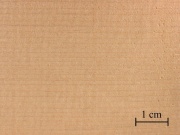Difference between revisions of "Port Orford cedar"
Jump to navigation
Jump to search
(username removed) |
|||
| (3 intermediate revisions by 3 users not shown) | |||
| Line 4: | Line 4: | ||
== Description == | == Description == | ||
| − | A lightweight, strong-smelling wood obtained from a large cedar tree Chamaecyparis lawsoniana native to the Pacific coasts of California and Oregon. First lumbered in 1854, the yellowish wood has a fine texture and is strong. It is used for millwork, plywood, flooring, interior finish, and storage chests. | + | A lightweight, strong-smelling wood obtained from a large cedar tree (''Chamaecyparis lawsoniana'') native to the Pacific coasts of California and Oregon. First lumbered in 1854, the yellowish wood has a fine texture and is strong. It is used for millwork, plywood, flooring, interior finish, and storage chests. |
== Synonyms and Related Terms == | == Synonyms and Related Terms == | ||
| Line 10: | Line 10: | ||
white cedar; Chamaecyparis lawsoniana | white cedar; Chamaecyparis lawsoniana | ||
| − | + | == Physical and Chemical Properties == | |
| − | + | * Color: Heartwood is light yellowish brown; Sapwood is pale yellow and not easily distinguished; color darkens with light, but turns gray outdoors | |
| − | + | * Grain: Straight with fine texture | |
| − | + | * Durability: Very resistant to decay and most insect attacks | |
| − | + | * Odor: Sweet pungent scent | |
| + | * Density = 29 pcf | ||
| + | ==Working Properties== | ||
| + | * Easy to work with both hand and machine tools | ||
| + | * Holds paint well | ||
| + | * Stains, glues, and finishes well | ||
| − | == | + | == Resources and Citations == |
| + | * The Wood Database: [https://www.wood-database.com/port-orford-cedar/ Port Orford Cedar] | ||
| − | * | + | * G.S.Brady, ''Materials Handbook'', McGraw-Hill Book Co., New York, 1971 Comment: p. 166 |
* ''Dictionary of Building Preservation'', Ward Bucher, ed., John Wiley & Sons, Inc., New York City, 1996 | * ''Dictionary of Building Preservation'', Ward Bucher, ed., John Wiley & Sons, Inc., New York City, 1996 | ||
| − | * | + | * West Coast Lumbermen's Association, Seattle, Wash.; air-dry weight = 29 pcf |
[[Category:Materials database]] | [[Category:Materials database]] | ||
Latest revision as of 12:01, 20 August 2022
Description
A lightweight, strong-smelling wood obtained from a large cedar tree (Chamaecyparis lawsoniana) native to the Pacific coasts of California and Oregon. First lumbered in 1854, the yellowish wood has a fine texture and is strong. It is used for millwork, plywood, flooring, interior finish, and storage chests.
Synonyms and Related Terms
white cedar; Chamaecyparis lawsoniana
Physical and Chemical Properties
- Color: Heartwood is light yellowish brown; Sapwood is pale yellow and not easily distinguished; color darkens with light, but turns gray outdoors
- Grain: Straight with fine texture
- Durability: Very resistant to decay and most insect attacks
- Odor: Sweet pungent scent
- Density = 29 pcf
Working Properties
- Easy to work with both hand and machine tools
- Holds paint well
- Stains, glues, and finishes well
Resources and Citations
- The Wood Database: Port Orford Cedar
- G.S.Brady, Materials Handbook, McGraw-Hill Book Co., New York, 1971 Comment: p. 166
- Dictionary of Building Preservation, Ward Bucher, ed., John Wiley & Sons, Inc., New York City, 1996
- West Coast Lumbermen's Association, Seattle, Wash.; air-dry weight = 29 pcf
